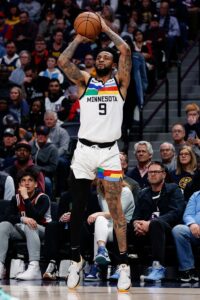JULY 9: Both signings are now official, per NBA.com’s transaction log.
JUNE 30: The Timberwolves have reached agreements with free agents Nickeil Alexander-Walker and Troy Brown.
 Alexander-Walker is re-signing with Minnesota on a two-year deal, Jon Krawczynski of The Athletic tweets. Brown is leaving the Lakers to join the Timberwolves, ESPN’s Adrian Wojnarowski tweets.
Alexander-Walker is re-signing with Minnesota on a two-year deal, Jon Krawczynski of The Athletic tweets. Brown is leaving the Lakers to join the Timberwolves, ESPN’s Adrian Wojnarowski tweets.
The Wolves declined to give Alexander-Walker a qualifying offer to make him a restricted free agent but will re-sign him using his Bird rights on a two-year, $9MM deal, tweets Jon Krawczynski of The Athletic.
According to Mike Singer of Denver Post (Twitter link), Brown will get a two-year contract worth north of $8MM, with a second-year team option. The Wolves will have to use a cap exception – either the mid-level or bi-annual – to complete that signing.
Alexander-Walker, acquired in a deadline deal from Utah, appeared in 23 games off the bench for Minnesota last season. He averaged 5.9 points, 1.8 rebounds and 1.4 assists in 15.5 minutes. He’ll add depth behind starting shooting guard Anthony Edwards.
Brown, 23, played a prominent role for Los Angeles last season, appearing in 76 games, including 45 starts. He averaged 7.1 points and 4.1 rebounds in 24.5 minutes and made a career-best 38.1% of his 3-point attempts. The 6’6” Brown previously played for Washington and Chicago and could start or play a second-unit role with the Timberwolves.
In essence, he swapped places with former Timberwolves forward Taurean Prince, who agreed to a one-year deal with the Lakers.